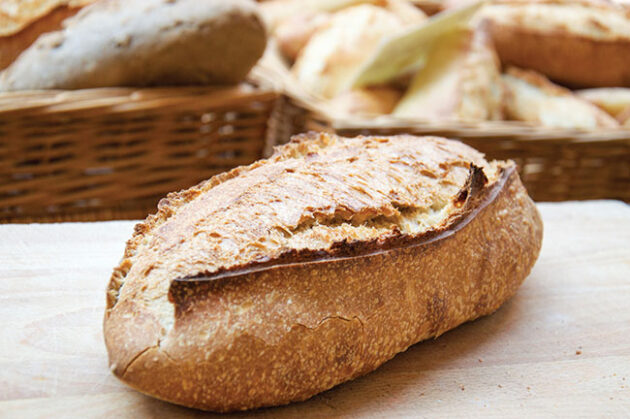
Bakery Showcase 2024: Focus on artisan baking
November 24, 2023
By Bakers Journal
Artisan baking, competitions, education and cutting-edge technology and services will come together at Bakery Showcase May 5-6 in Toronto
 Issa Niemeijer-Brown. Photo: Sander Veeneman
Issa Niemeijer-Brown. Photo: Sander Veeneman Issa Niemeijer-Brown, co-founder of Gebroeders Niemeijer bakery in Amsterdam, will perform a demonstration of artisan baking skills and take part in a panel on the future of artisan baking at Bakery Showcase May 5-6, 2023. Bakers Journal spoke with the passionate baker and author of A Book About Bread: A Baker’s Manual to glean his thoughts on the artisan tradition.
How did you get involved in professional baking?
I always liked to bake, but never imagined myself becoming professional. While I was finishing my studies at university I started to bake more and more at home and applied for a part-time apprenticeship at one of Amsterdam’s best bakeries, called Hartog’s Volkoren. Rather than having a job interview, I was simply put to work. During that time I also kept baking at home. After about a year I took my homemade baguettes with me when visiting the first artisan French bakery in The Netherlands: Du Pain, located in Rotterdam. The quality of the baguettes took the owner by surprise, as he had never imagined it would be possible to make such quality at home, in just a regular oven and without any equipment. That bakery subsequently gave me my first position as a professional baker.
What surprised you the most about artisan baking?
While working in my first bakery job as an apprentice I started to bake more and more at home as well. I went in search of the flavours I remembered from my childhood visits to family in France. Like many fanatic home bakers, I was trying to understand all the physics and chemistry behind bread to further my quest. I worked through all literature that I could lay my hands on. I experimented with all kinds of different procedures and ingredients. I wanted to make the best possible bread. I expected my colleagues at the bakeries where I worked to do the same. That turned out to be a little different.
I was surprised to discover that many bakers were mostly interested in something that would be predictable in both its making and its sales. Knowledge of how to improve quality, especially with regard to flavour, was not relevant. All that mattered was the appearance of the bread. As such, the tools offered by industry to enhance an artisanal appearance, regardless of the flavour and quality of the bread, were welcomed all around. This was surprising to me because I thought artisanal baking would always prioritize flavour and quality.
Thinking back, I understand more about this situation – the need to keep a business running, the wish to make the work physically lighter and financially more rewarding, the diverse conditions that many bakers come from and the way that affects interests, versus my own privilege. While I am no longer surprised by these conditions, I still think we should strive for quality!
Is it more important to produce artisan baked goods of consistent, uniform quality or to let bakers put their own stamp on artisan products?
This is a real dilemma. Customers expect constant quality and are used to supermarket products that always look and taste exactly the same. When we buy fruit, it needs to be shiny, even and without bruises. The same logic applies to baked goods. But just like with fruit, the nicest bread or pastry is not necessarily the one that will always be exactly the same or that looks the most shiny. And just like fruit is taken from the tree before it is totally ripe, to make pastries or breads that are consistent and uniform, a baker will have to set up the process in a way that consistency is assured, rather than the highest possible quality.

“I think it greatly increases the pleasure of the consumer, if taste and consistency have little variations from day to day,” says Issa Niemeijer-Brown. PHOTO BY BENTE NIEMEIJER
On top of that, there is also another logic at play. The more a process is dependent on the skill of the baker, the more precarious it gets. What if an employee moves to another job and somebody new needs to be hired? What if the head baker is ill? What if the owner retires? What I see is that even in artisan bakeries, in order to survive as a business and to play it safe, it makes a lot of sense to have a process that is more regulated and that any baker with only minimal adjustment can fit into. And especially with bigger bakeries that have multiple locations, it is almost impossible to sustain a process that is too much dependent on the skill, drive, intuition and decisions of the baker.
I think it is important not to give in to these tendencies and not to go for a process that prioritizes reliability at the expense of flavour. To me, to have an artisan bakery means that variation in quality is part of the deal. It is OK if a bread or pastry is not perfect sometimes, just because that makes it also possible for it to be exceptional on other days. And in the end, I think it also greatly increases the pleasure of the consumer, if taste and consistency have little variations from day to day, and if sometimes you are surprised and taken off your feet with just one bite.
In your book, you talk about learning the basics and then making a series of choices as a baker. Can you elaborate?
Most bakery books present a short introduction explaining a little about the basic steps in making doughs, which is then followed by a series of step-by-step recipes. Professional textbooks and instruction manuals often contain a part about the mechanics and chemistry of doughs, the makeup of a grain kernel, the use of different types of equipment, and then proceed with general formulas. However, in both cases the relation between the two parts is left vague or not even touched upon. In A Book About Bread I integrate theory and practice in a way that enables you to modify recipes or create your own recipes. And most importantly, to use intuition and feeling when baking – adjust to the flour, adjust to the circumstances, the equipment at hand, the time you have available – without feeling constraint. To do that, you do not need to know the exact chemical makeup and baking characteristics of the flour at hand (which by the way you normally would not know anyway, not even as a professional artisan baker), nor do you need to measure the humidity of the air or control external circumstances. But you do need to understand which processes are at work in a dough and be able to “read” the dough as it develops. And how different techniques and choices impact the quality and characteristics of the bread you are making.
Like in other bakery books, we also provide our recipes and share exactly how we do things at our bakery, but it is just a starting point to familiarize yourself with different techniques.
What can professional bakers learn from A Book About Bread?
Because the book breaks down the process of making bread to its fundamental building stones it is equally suited to all levels. Beginning bakers can make their first breads, and very quickly become successful. Professional bakers can get inspiration adjusting their processes and often reach far better quality or be able to develop more unique products. Apart from giving space to the intuition of the baker, the book also provides an analysis of different techniques used. It integrates more recent developments in North America, such as the use of cold fermentation or higher hydration doughs, with a deep understanding of and familiarity with classic French baking. It thus offers a unique perspective.
What to expect at Showcase
At Bakery Showcase 2024,the Baking Association of Canada will highlight innovation via informative panels, demonstrations and exciting competitions. Highlights include: demonstrations on artisan bread making and award-winning pizza; a competition for professional bakeries and a “My Canada!” student cake competition and a panel on Artisan Baking into the Future.
For more artisan breadmaking tips, follow @abookaboutbread on Instagram. The Baking Association of Canada’s Bakery Showcase will take place at the Toronto Congress Centre May 5-6, 2024. Register online now at bakeryshowcasecanada.ca!
Print this page
Leave a Reply